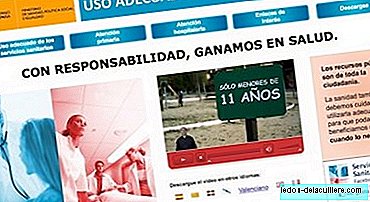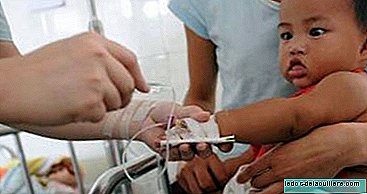
As many of you will have seen in different media, the Ministry of Health has launched a campaign to promote the proper use of health services.
These types of campaigns in general are always good, since I can affirm, in the first person, that an extraordinary percentage of the emergencies that are treated in hospitals cannot really be considered as such.
However, I am also aware that it can be very obvious to oneself, it does not apply so easily to children, so that with them it is very easy that everything seems more serious, and of course, worrying. Who has not raised the doubt of whether he should go to the emergency room before a sudden picture of fever or vomiting in an infant? Come on, when children are in the middle it is not always so easy ...
That is why it is normal that, especially in younger children, the question always arises: Where is the point of balance when deciding when to go to the emergency room? In this post we try to analyze the main aspects of this important campaign, but applying them to the little ones.
Data on the use of emergencies
According to the Ministry of Health, 75% of the emergencies occur at the request of the citizens themselves, who go to the hospital without first consulting their health center. This is a striking fact, because in a high percentage of sites there are the so-called Continuous Care Points (or other similar names), where there is medical care (including pediatric) 24 hours a day.
Another striking percentage is the one that indicates that at least 60% of the emergencies could be resolved in Primary Care. It is a considerable figure, considering that the cost of attending a patient in an emergency department is terribly higher than that of a primary consultation. If true, that means that a considerable amount of money is being wasted that could be paradoxically destined to improve primary care coverage, for example.
But how do you know when to take a child?
That is the big question that any father or mother ends up asking. Although, for oneself, it is easy to determine when we should go to the emergency room (usually one intuits if what you have can be serious or not), it is easy to understand (and managers and politicians should do it), that when it comes to Children do not have that reference.
This happens more in the little ones, since a child of 3-4 years can more or less accurately express what happens to him. However, this is difficult in children under 3 years, and impossible in children under 2 years. In addition, other factors join in infants, such as the less experience in first-time parents, or their greater helplessness (due to less development of the immune system).
For these reasons It is very difficult to know when to go to an emergency department with a child, in the presence of a symptom that worries parents. The best advice would be to try to use common sense, but of course, this is not easy unless this "sense" has been trained.
The best way to acquire criteria that can help parents determine if they should take a small child to the emergency room or not, is follow some simple recommendations:
- Go to follow-up reviews of a healthy child in the pediatrician's office. In these reviews, the professional not only evaluates the child, but explains to the parents many aspects of their development and common diseases.
- Learn to distinguish signs or symptoms of severity, such as poor color, poor muscle tone, lack of appetite in infants, or even signs of respiratory distress in children with underlying processes, such as asthma.
- When looking for information, always use reliable, understandable and reliable sources. Internet is a great tool, but like any tool, misused can generate catastrophic results. In case of consulting aspects related to children's health, you should always go to the pages of institutions or professionals, signed and accredited, and remember that the information is usually indicative and never replaces the assessment of the professional on site.
- Learn how our son is. This is a point that may seem very simple but sometimes it is not so much: only by investing time and effort, you can get to know every detail of the child and their answers perfectly, so that you can “intuit” when something is not right . Although it may seem a lie, pediatricians give us a lot of respect when, parents who see themselves know their son well, indicate that, "something is wrong with your little one."
- As we said at the beginning, use common sense: ask, learn, consult and use the resources that our health system makes available to us. If we can avoid going to a hospital with a small child (because of the risks that entails), great. But of course a risk should never be assumed, especially in a child who cannot transmit what he feels.












